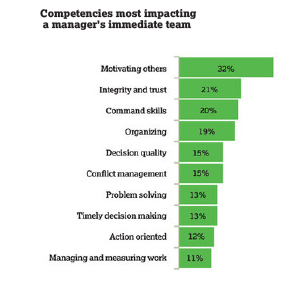by Charles Plant | May 29, 2012 | Management, Research
Back to the Futurestep survey I mentioned last week. This survey looked at something it calls consequential impact which is essentially your ability to get things done through others. Whether you manage people, projects, products or process, you’ll need to get things done through other people. The question the survey attempted to answer was what skills are necessary for you to have consequential impact on your own direct reports. No surprise here but your ability to motivate others and integrity and trust were the most important characteristics. As you move away from being an individual contributor to being a manager of people, such things as problem solving become less important than motivating your direct reports to solve the problems themselves.

by Charles Plant | May 28, 2012 | Exercises
Over the next many weeks, we’ll be presenting a series of leadership and management exercises to help you understand yourself better and to help you become a better leader. This is the first of these exercises. Watch out for them on Mondays as long as I stay organized.
What Drives You?
One of the key factors in emotional intelligence is understanding your emotions. You need to know what drives, angers, motivates, frustrates, and inspires you. By knowing these drivers, you’ll understand why you react the way you do in certain situations. By knowing why you react, you’ll be better able to manage your own emotions and present a controlled and capable exterior in emotional situations.
The Exercise
So here it is, the exercise. Over the next week, pay attention to your emotions. Tune in to the way you are feeling when you’re working, talking to people, or in meetings. As you become aware of those emotions, jot down what was happening and how you were feeling in a little journal. At the end of the week, do some analysis of those feelings. Look for common patterns and identify the things that made you:
- angry
- frustrated
- motivated
- inspired
If you want to learn more about this subject, read Daniel Goleman’s book “Emotional Intelligence” or click here.
by Charles Plant | May 25, 2012 | Research
 Research out of Columbia University summarized here suggests that men’s dominance of the ‘C’ Suite may not in fact be due to discrimination but to over confidence.
Research out of Columbia University summarized here suggests that men’s dominance of the ‘C’ Suite may not in fact be due to discrimination but to over confidence.
In an amusing set of studies, the researchers set out to determine whether men have an easier time ‘faking it’ due to natural overconfidence. The research shows that while both men and women exaggerate capabilities (aka, lie), men happen to over-report their results more than women. Not only do men exaggerate more than women, they tend to lie more the larger financial reward.
Thus you can see a board of directors faced with two candidates for the role of CEO, one a man, the other a woman, They both might have equal capabilities, but the man’s over-confidence and exaggeration of results compared to the woman is going to get him the job.
by Charles Plant | May 24, 2012 | Innovation, Learning
 Creative people don’t retire. They just keep on creating.
Creative people don’t retire. They just keep on creating.
It’s probably because we love our work that we never want to stop. The question is: Do you love what you do enough to say the same thing? Do you love your work enough to never want to retire? And if you don’t then why not?
Why would you stay doing something that you didn’t absolutely love?
by Charles Plant | May 23, 2012 | Management
Why is it that so many CEO’s with bad leadership skills can continue to exist in organizations? The problem often comes down to a board of directors not doing its job properly.
The board has two jobs, to hire and fire the CEO and to comment on strategy. A board that doesn’t get feedback on a CEO’s leadership skills isn’t doing its job.
It can’t only look at results but must look at leadership skills through such things as 360s to ensure that the CEO’s soft skills are measuring up. Developing and maintaining effective leadership skills is an ongoing process that must be worked on continuously in a conscious manner and must also be evaluated formally on a periodic basis. Without conscious effort to develop and evaluate leadership skills, we’ll be stuck with a bad bunch of bosses.



